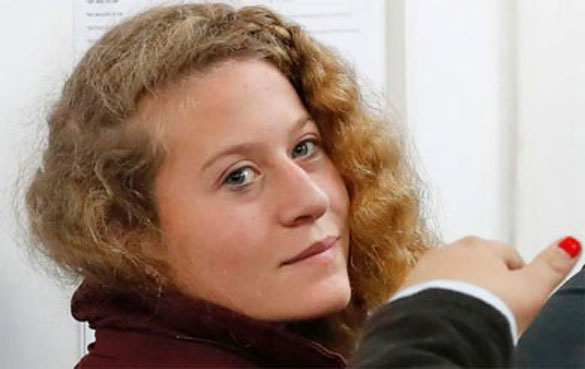Brave Ahed Tamimi a Prisoner amid War of Images
By Daoud Kuttab
3 January 2018
 Palestinian protester Ahed Tamimi, right, appears at that military court at Ofer Prison in the West Bank, December 20, 2017. Ahmad Gharabli / AFP
Palestinian protester Ahed Tamimi, right, appears at that military court at Ofer Prison in the West Bank, December 20, 2017. Ahmad Gharabli / AFP
---------
A single image has produced polar opposite reactions. The bravery of a young Palestinian child challenging the heavily armed Israeli soldier spoke volumes to many in terms of its power and courage. The very same image exposed the weakness of the region’s most powerful army, which has been illogically sent to chase after children, whose only weapon is their hand.
The slap by an unarmed female Palestinian teenager to a male soldier armed to the teeth reflected the Israeli overreach in trying to keep a proud people totally under their military control.
Under the glare of cameras photographing their every move, Israeli soldiers belonging to what they call “the most moral army” in the world were left helpless.
The reaction of the soldiers was no act of self-discipline; this was sheer calculations of choosing the path of less resistance while the cameras were rolling. For Israelis, the “payback” as one journalist called it, was delivered late at night without the cameras.
So this is no longer a conflict about who controls the land, or who the real terrorists and land thieves are. This has become a war of images, which side can capture the other in an embarrassing pose.
The 12-count indictment that was handed down on Sunday against 16-year-old Ahed Tamimi and the indictment against her mother have nothing to do with justice or the rule of law. They are aimed at trying to restore the macho image of male Israeli soldiers, who could not or would not react to a young Palestinian girl whose family and friends were armed with a Cellphone camera.
The Israeli military judge who hears the case — whose colleagues have handed down decisions in favour of their own army in almost every similar case — is unlikely to pay any attention to the context or the motive of the action. He will look at the slap in total isolation of the location, of what happened before, and of the much larger context of a decades-long illegal occupation and settlement enterprise that has been deemed a war crime.
Ahed’s defence of her home has not been part of the international or Israeli media picture and will not be part of the court deliberations. Ahed’s age as a child who is to be protected according to international law will also not feature. An Israeli military judge, who is fine with bringing a teenager in front of him with her feet and hands cuffed and actually buys the argument that setting her free would endanger the powerful Israeli army, is not a judge who can mete out a just decision. Since the 15th century, Lady Justice has often been depicted wearing a blindfold, which is supposed to represent objectivity — showing that justice is or should be meted out objectively, without fear or favour, and regardless of identity, money, power, or weakness; blind justice and impartiality.
America’s pro-Israeli ambassador David Friedman wants the US to stop using the term “Occupied Territories.” But the military trial of a shackled teenager who was defending her home, her town and her country from a foreign military occupation is the most physical proof of the continuation of this occupation, and the Fourth Geneva Convention must be applied to the actions of the Israeli army. The convention, which is supposed to regulate the behaviour of an occupying power, bars this power from bringing its citizens to occupied areas and has very special rules of how the occupying power deals with non-combatants. Israel’s settlement policy is a continuing violation of this protocol, as is the decision by Israel to transfer Ahed Tamimi and her family member to jails inside the state of Israel.
The protests in the Palestinian village of Nabi Saleh, which is surrounded by illegal Israeli settlements and the wall declared illegal by the International Criminal Court, have been going on since Ahed was a toddler. Popular non-lethal resistance has been going on for years, with the Israelis unwilling to hear or respond to Palestinian complaints.
The Palestinian leadership is said to be ready to file a major suit against Israel for war crimes at the International Criminal Court, citing the continuing settlements on which the protests in Nabi Saleh are focused. The court in The Hague and not the Israeli military court is where Ahed and all Palestinians want to see justice served, and the occupation and illegal settlements of the Israeli aggressors be called by their name — a war crime.
• Daoud Kuttab is an award-winning Palestinian journalist.
Source: arabnews.com/node/1218111
URL:
